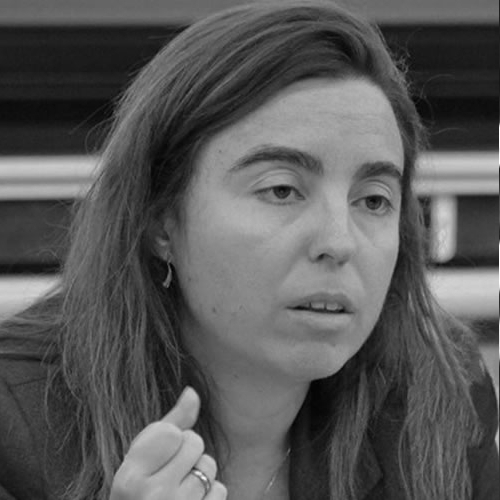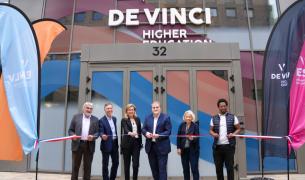
Laura Recuero Virto has expertise on radio frequency, natural resource conservation, and infrastructure economics. She has recently worked for the Ocean University Initiative at the European University for Marine Affairs as research coordinator with a special focus on underwater noise propagation and its impact on biodiversity. She has previously worked for the French Ministry of foreign affairs as head of unit on economic analysis and globalization and chief economist, as well as for the OECD, the French Regulatory Authority on Telecommunications, the French Electronic Communications, Postal and Print media distribution Regulatory Authority, the French Regulatory Authority for Railway and Road Activities, Télécom ParisTech, the World Bank Institute, Nortel Networks, le Centre National d'Etudes Spatiales and the European Space Agency. At Télécom ParisTech, Nortel Networks, and the French and European space agencies, she worked on radio frequency R&D and operational projects. At the OECD, she contributed to the African economic outlook, with a special focus on telecom infrastructure. She has contributed to ministerial meetings on telecom infrastructure (African Union, OECD-NEPAD) and has media appearances in Le Monde, Financial Times, Les Afriques, RFI, amongst others. She was recently seconded to the Environment Directorate at the OECD to produce content on the potential contribution of the OECD to marine spatial planning and to the indicators on the Sustainable Development Goal 14 ?Conserve and sustainably use the oceans, seas and marine resources for sustainable development?. She has given courses on environmental and natural resource economics at Mines ParisTech, SciencePo Paris and on econometrics and biodiversity economics at the Polytechnic School of Paris. She holds a B.A. degree on telecommunications engineering, an MBA on international trade (Polytechnic University of Madrid), a PhD in economics (Toulouse School of Economics), and a PhD in environmental engineering with a focus on biodiversity conservation (Polytechnic University of Madrid). She has an HDR (Habilitation pour diriger des recherches) from Paris Dauphine since 2016.
laura.recuero_virto@devinci.fr
Akoh Fabien Yao; Maxime Sèbe; Laura Recuero Virto; Abdelhak Nassiri; Hervé Dumez
The effect of LNG bunkering on port competitiveness using multilevel data analysis Article de journal
Dans: Transportation Research Part D-Transport And Environment, vol. 132, p. 104240, 2024.
@article{yao_3011,
title = {The effect of LNG bunkering on port competitiveness using multilevel data analysis},
author = {Akoh Fabien Yao and Maxime Sèbe and Laura Recuero Virto and Abdelhak Nassiri and Hervé Dumez},
url = {https://doi.org/10.1016/j.trd.2024.104240},
year = {2024},
date = {2024-07-01},
journal = {Transportation Research Part D-Transport And Environment},
volume = {132},
pages = {104240},
abstract = {Environmental practices can enable most businesses, including ports, to gain a competitive advantage. Given the chicken-and-egg dilemma for the adoption of alternative fuels in the shipping industry, this article assesses whether and to what extent ports have incentives to provide liquefied natural gas (LNG) bunkering infrastructure. More specifically, we test whether such facilities positively affect the competitiveness of the ports, which would be an additional incentive to drive the transition to alternative fuels. Using multilevel regressions and propensity score matching on LNG-fueled vessel movements in the Baltic Sea Region in 2019, we found no significant effect of LNG bunkering infrastructure on port competitiveness, measured by port choice probabilities expressed by vessels. Although our findings indicate that ports do not gain a competitive advantage in the short-term, we do not rule out potential gains in the long-term. Policy intervention is desirable in the short-term to maintain incentives for port investments.},
keywords = {},
pubstate = {published},
tppubtype = {article}
}
Farid Gasmi; Paul Noumba Um; Laura Recuero Virto; Peter Saba
Digital Literacy, Sustainable Development and Radiation Regulation: Policy and Information Systems Implications Article de journal
Dans: Information Systems Frontiers, 2024.
@article{gasmi_2968,
title = {Digital Literacy, Sustainable Development and Radiation Regulation: Policy and Information Systems Implications},
author = {Farid Gasmi and Paul Noumba Um and Laura Recuero Virto and Peter Saba},
url = {10.1007/s10796-024-10488-9},
year = {2024},
date = {2024-05-01},
journal = {Information Systems Frontiers},
abstract = {This paper explores the convergence of development economics, regulatory policies, and public health considerations within the field of Information Systems (IS) research, focusing specifically on 5G and 6G mobile technologies. Despite the widespread deployment of these technologies and their potential health implications, there is a limited understanding in IS literature on why countries adopt varying thresholds for radiation regulation. Our study, analyzing data from 124 countries, uncovered an inverted U-shaped relationship between digital literacy and the rigidity of radiation regulation. This finding reveals that nations with lower digital literacy levels tend to enforce stricter regulations, whereas those with higher literacy levels adopt more relaxed policies. By highlighting how digital literacy, a critical aspect of the digital divide, significantly influences regulatory frameworks in telecommunications, this study contributes to filling the gap in IS research. This under- scores the necessity of informed and transparent regulatory decision making, especially in countries with diverse levels of digital literacy. Calling for a multidisciplinary approach to policy formulation, our work enriches the broader discourse in IS research, underlining the pivotal role of digital literacy in shaping both the access and regulatory landscapes of emerging technologies.},
keywords = {},
pubstate = {online},
tppubtype = {article}
}
Laura Recuero Virto; Arno Thielens; Marek Czerwinski; Jérémy Froidevaux
The exposure of non-human living organisms to mobile communication emissions: A survey to establish European stakeholders' policy option preferences Article de journal
Dans: Risk Analysis, 2024.
@article{recuero_virto_2960,
title = {The exposure of non-human living organisms to mobile communication emissions: A survey to establish European stakeholders' policy option preferences},
author = {Laura Recuero Virto and Arno Thielens and Marek Czerwinski and Jérémy Froidevaux},
url = {https://onlinelibrary.wiley.com/doi/10.1111/risa.14322},
year = {2024},
date = {2024-05-01},
journal = {Risk Analysis},
abstract = {There is an unprecedent exposure of living organisms to mobile communications radio-frequency electromagnetic field emissions. Guidelines on exposure thresholds to limit thermal effects from these emissions are restricted to humans. However, tissue heating can occur in all living organisms that are exposed. In addition, exposure at millimetric frequencies used by 5G may impact surface tissues and organs of plants and small size species. It is also expected that the addition of 5G to existing networks will intensify radiofrequency absorption by living organisms.
A European Parliament report proposed policy options on the effects of RF-EMF exposure of plants, animals and other living organisms in the context of 5G: funding more research, implementing monitoring networks, accessing more information from operators on antennas and electromagnetic field emissions, and developing compliance studies when antennas are installed. However, there is no evidence on the preferences of relevant stakeholders regarding these policy options. This paper reports the findings of a survey of key European stakeholders' policy option preferences based on the European Parliament's report. It reveals a broad consensus on funding more research on the effects of exposure of plants, animals, and other living organisms to electromagnetic fields. It also highlights the need for deliberation concerning the other policy options that could provide solutions for regulatory authorities, central administrations, the private sector, non-governmental associations and advocates, and academics. Such deliberation would pave the way for effective solutions, focusing on long-term output from funding research, and enabling short-term socially and economically acceptable actions for all parties concerned.},
keywords = {},
pubstate = {online},
tppubtype = {article}
}
Laura Recuero Virto; Marek Czerwinski; Jérémy Froidevaux
The determinants of legislation for radiofrequency electromagnetic fields (RF-EMF) with the onset of 5G: An empirical analysis with a worldwide cross-sectional dataset Article de journal
Dans: Risk Analysis, 2024.
@article{recuero_virto_2907,
title = {The determinants of legislation for radiofrequency electromagnetic fields (RF-EMF) with the onset of 5G: An empirical analysis with a worldwide cross-sectional dataset},
author = {Laura Recuero Virto and Marek Czerwinski and Jérémy Froidevaux},
url = {https://onlinelibrary.wiley.com/doi/10.1111/risa.14298},
year = {2024},
date = {2024-03-01},
journal = {Risk Analysis},
abstract = {The unprecedented exposure of radiofrequency electromagnetic field (RF-EMF) to humans from mobile communications raises serious public concern about the possibility of unexpected adverse health effects and has stimulated authorities to adopt precautionary exposure limits. These limits are distinctly different across countries,
and the causes of these differences are unclear from the literature. This article is the
first empirical analysis on the determinants of RF-EMF exposure legislation, using a novel cross-sectional database of 164 countries worldwide. The analysis shows that decentralization and mobile competition in countries with low mobile network deployment tend to promote more stringent RF-EMF exposure limits across the dataset with 164 countries. In more decentralized countries, the regions had a greater influence on national legislation and could accommodate local demands with the advent of mobile technology in the 2000s. In contrast, decentralization and mobile competition in countries
with high levels of mobile network deployment tend to relax RF-EMF exposure limits in the sample of 61 countries with fifth-generation (5G) technology. Indeed, restrictive RF-EMF exposure limits are constraining 5G deployment in a context of the widespread adoption of mobile-broadband technologies. These results should be useful for policymakers and mobile operators alike to anticipate the outcome of legislation in countries that have yet to introduce 5G technology. The results should also be
useful when reviewing policies and strategies for the implementation of the upcoming 6G technology in frequency bands that will be increasingly higher (above 6 GHz up to THz for very local usage), and hence where the health effects on humans are less well studied.},
keywords = {},
pubstate = {online},
tppubtype = {article}
}
Jérémy Froidevaux; Laura Recuero Virto; Marek Czerwinski; Arno Thielens; Kirsty J. Park
Addressing Wildlife Exposure to Radiofrequency Electromagnetic Fields: Time for Action Article de journal
Dans: Environmental Science & Technology Letters, vol. 11, no. 1, p. 3-4, 2024.
@article{froidevaux_2543,
title = {Addressing Wildlife Exposure to Radiofrequency Electromagnetic Fields: Time for Action},
author = {Jérémy Froidevaux and Laura Recuero Virto and Marek Czerwinski and Arno Thielens and Kirsty J. Park},
url = {https://pubs.acs.org/doi/10.1021/acs.estlett.3c00795},
year = {2024},
date = {2024-01-01},
journal = {Environmental Science & Technology Letters},
volume = {11},
number = {1},
pages = {3-4},
abstract = {With the rapid global expansion of mobile communication networks and the introduction of new radiofrequencies, especially above 6 GHz with the emergence of 5G/6G technology, there is an urgent requirement to investigate and tackle the possible effects of radiofrequency electromagnetic field emissions on wildlife. Here, we highlight (i) the pressing need for robust research on this topic, (ii) the inadequacy of existing guidelines from the International Commission for Non-Ionizing Radiation Protection, which solely address human health, and (iii) the lack of attention given to wildlife exposure to radiofrequency electromagnetic field levels when creating and/or restoring wildlife habitats and deploying new radiofrequency electromagnetic field sources. We call for a common worldwide agenda that would prioritize research on wildlife exposure to radiofrequency electromagnetic fields and for an independent international organization to address this issue. Finally, we provide key recommendations aimed at reducing wildlife exposure to radiofrequency electromagnetic fields while awaiting further evidence.},
keywords = {},
pubstate = {published},
tppubtype = {article}
}
Farid Gasmi; Laura Recuero Virto; Denis Couvet
An empirical analysis of economic growth in countries exposed to coastal risks: Implications for their ecosystems Article de journal
Dans: Economic Systems, vol. 47, no. 4, p. 101130, 2023.
@article{gasmi_2391,
title = {An empirical analysis of economic growth in countries exposed to coastal risks: Implications for their ecosystems},
author = {Farid Gasmi and Laura Recuero Virto and Denis Couvet},
url = {https://doi.org/10.1016/j.ecosys.2023.101130},
year = {2023},
date = {2023-12-01},
journal = {Economic Systems},
volume = {47},
number = {4},
pages = {101130},
abstract = {Using a novel database on countries exposed to coastal risks (CR), this paper estimates an augmented neoclassical growth model that encompasses eight other new growth models. To account for uncertainty related to the number of models and choice of growth determinant proxies, we use a Bayesian averaging of classical estimates (BACE) approach. A preliminary examination of the data reveals that a country that faces coastal risks is likely to be a former British colony characterized by a common law legal framework, a parliamentary political system, a high degree of international trade openness, little language and ethnic fractionalization, a low level of public sector corruption, and a high rate of fertility. The BACE-based model selection procedure shows that, in CR countries, the growth determinant proxies typically used in the neoclassical, macroeconomic policy, natural resources, and institutions theories are significantly correlated with growth. These results suggest two implications related to these countries' coastal ecosystems. First, because they are heavily dependent on natural resources and have high fertility rates, these countries might seek short-term economic gains at the expense of deterioration in their ecosystems. Second, these countries' good institutions and low levels of ethnic division might be conducive to sustainable management of these ecosystems.},
keywords = {},
pubstate = {published},
tppubtype = {article}
}
Marek Czerwinski; Alain Vian; Ben A. Woodcock; Piotr Golinski; Laura Recuero Virto; ?ukasz Januszkiewicz
Do electromagnetic fields used in telecommunications affect wild plant species? A control impact study conducted in the field Article de journal
Dans: Ecological Indicators, vol. 150, no. June 2023, p. 11, 2023.
@article{czerwinski_2383,
title = {Do electromagnetic fields used in telecommunications affect wild plant species? A control impact study conducted in the field},
author = {Marek Czerwinski and Alain Vian and Ben A. Woodcock and Piotr Golinski and Laura Recuero Virto and ?ukasz Januszkiewicz},
url = {https://www.sciencedirect.com/science/article/pii/S1470160X23004090?via%3Dihub},
year = {2023},
date = {2023-06-01},
journal = {Ecological Indicators},
volume = {150},
number = {June 2023},
pages = {11},
abstract = {Over the last three decades there has been an unprecedented increase in both the coverage of wireless communication networks and the resultant radiofrequency electromagnetic field (RF-EMF) exposure level. There is growing concern that this rapid environmental change may have unexpected consequences for living organisms. Existing research on plants has shown that RF-EMF radiation can affect their growth and development, gene expression and various metabolic activities. However, these findings are largely derived from short-time exposure of crop plants under laboratory conditions. It remains unclear to what extent plants are affected by artificial RF-EMFs in real ecosystems and what potential consequences this could have for ecosystems. This study attempts to assess these long-term effects of RF-EMF exposure on wild plants under controlled experimental field conditions. We investigated the impacts of RF-EMF exposure (866-868 MHz frequency band) from seed germination to maturation for ten common herbaceous plant species over a four-month period. The selected plant species belong to various families and have different functional and morphological traits that might affect a response to the applied RF-EMF.
For most of the considered species responses to RF-EMF were undetectable or weak, and where present restricted to a single trait. Only for one species, Trifolium arvense, were effects observed at different plant development stages and for different plant characteristics. In this species RF-EMF stimulated growth and probably influenced leaf heliotropic movements, as indicated by a larger height, larger leaf area and altered leaf orientation one month after germination. However, over the growing season Trifolium arvense plants exposed to RF-EMF entered the phase of senescence earlier, which was manifested through a reduction of green leaf area and an increase in the area of discolored leaf.
We conclude that the effects of RF-EMF exposure at environmentally relevant levels can be permanent and irreversible in plants growing in the open natural environment, however, these effects are restricted to specific species. This in turn suggests that future studies should examine whether the effects observed here occur also in more common Trifolium species or other legumes that are a keystone component within European grasslands. Our findings also show that Trifolium arvense could be a candidate indicator of man-made RF-EMFs in the environment.},
keywords = {},
pubstate = {published},
tppubtype = {article}
}
Maxime Sèbe; Laura Recuero Virto; Pierre Scemama; Anne Choquet; Jean-Luc Jung; Aldo Chircop; Phénia Marras-Aït Razouk; Sylvain Michel; Valérie Stiger-Pouvreau
Maritime transportation: Let's slow down a bit Article de journal
Dans: Science Of The Total Environment, vol. 811, p. 152262, 2022.
@article{sebe_1971,
title = {Maritime transportation: Let's slow down a bit},
author = {Maxime Sèbe and Laura Recuero Virto and Pierre Scemama and Anne Choquet and Jean-Luc Jung and Aldo Chircop and Phénia Marras-Aït Razouk and Sylvain Michel and Valérie Stiger-Pouvreau},
url = {https://www.sciencedirect.com/science/article/pii/S0048969721073381},
year = {2022},
date = {2022-03-01},
journal = {Science Of The Total Environment},
volume = {811},
pages = {152262},
abstract = {Maritime transportation is a major contributor to the world economy, but has significant social and environmental impacts. Each impact calls for different technical or operational solutions. Amongst these solutions, we found that speed reduction measures appear to mitigate several issues: (1) collision with wildlife; (2) collision with non-living objects; (3) underwater noise; (4) invasive species; and (5) gas emission. We do not pretend that speed reduction is the best solution for each individual issue mentioned in this paper, but we argue that it could be a key solution to significantly reduce these threats all together. Further interdisciplinary research is required to balance private economic costs of speed reduction measures with environmental and social benefits emerging from all mitigated issues.},
keywords = {},
pubstate = {published},
tppubtype = {article}
}
Laura Recuero Virto; Hervé Dumez; Carlos Romero; Denis Bailly
How can ports act to reduce underwater noise from shipping? Identifying effective management frameworks Article de journal
Dans: Marine Pollution Bulletin, vol. 174, p. 22, 2022.
@article{recuero_virto_1970,
title = {How can ports act to reduce underwater noise from shipping? Identifying effective management frameworks},
author = {Laura Recuero Virto and Hervé Dumez and Carlos Romero and Denis Bailly},
url = {https://www.sciencedirect.com/science/article/pii/S0025326X2101170X},
year = {2022},
date = {2022-01-01},
journal = {Marine Pollution Bulletin},
volume = {174},
pages = {22},
abstract = {This paper aims to find mechanisms to align commercial interests with underwater noise reductions from commercial shipping. Through a survey and a series of interviews with representative stakeholders, we find that while acknowledging the wide variations in ports' specificities, port actions could support the reduction in underwater noise emissions from commercial shipping through changes in hull, propeller and engine design, and through operational measures associated with reduced speed, change of route and travel in convoy. Though the impact of underwater noise emissions on marine fauna is increasingly shown to be serious and wide-spread, there is uncertainty in the mechanisms, the contexts, and the levels which should lead to action, requiring precautionary management. Vessels owners are already dealing with significant investment and operating costs to comply with fuel, ballast water, NOx and CO2 requirements. To be successful, underwater noise programs should align with these factors.
Based on a multiple criteria decision making (MCDM) approach, we find a set of compromise solutions for a wide range of stakeholders. Ports could propose actions such as discounted port fees and reduced ship waiting times at ports, both depending on underwater noise performance. Cooperation between ports to scale up actions through environmental indexes and classification societies' notations, and integration with other ports' actions could help support this. However, few vessels know their underwater noise baseline as there are very few hydrophone stations, and measurement methodologies are not standardized. Costs increase and availability decreases dramatically if the vessel buyer wants to improve the noise profile. Local demands regarding airborne noise close to airports boosted global pressure on the aviation industry to adopt existing quieting technology. This experience of the aviation noise control could inform the underwater noise process.},
keywords = {},
pubstate = {published},
tppubtype = {article}
}
Farid Gasmi; Laura Recuero Virto; Denis Couvet
The impact of renewable versus non?renewable natural capital on economic growth Article de journal
Dans: Environmental & Resource Economics, vol. 77, no. 2, p. 271-333, 2020.
@article{gasmi_1972,
title = {The impact of renewable versus non?renewable natural capital on economic growth},
author = {Farid Gasmi and Laura Recuero Virto and Denis Couvet},
url = {https://link.springer.com/article/10.1007/s10640-020-00495-0},
year = {2020},
date = {2020-10-01},
journal = {Environmental & Resource Economics},
volume = {77},
number = {2},
pages = {271-333},
abstract = {In a dataset on 83 countries covering the years 1960-2009, we find a negative indirect effect of the share of renewable natural capital in wealth on economic growth transmitted through demographic factors, more specifically, population fertility. In contrast, in countries with lower income inequality and higher institutional quality, the share of non-renewable natural capital in wealth has a direct positive impact on growth. We also find that countries with higher income per capita, human development, and institutional quality have a higher share of renewable natural capital per capita, but a lower share of renewable natural capital in wealth. Renewable natural capital is thus valuable for the population and of primary concern for empowered countries, even though it contributes less to wealth and economic growth. Our results raise serious questions about the way wealth and growth are defined in economics when one investigates the impact of natural capital and point to the importance of preserving natural capital, particularly, in less developed countries.},
keywords = {},
pubstate = {published},
tppubtype = {article}
}
Gerald G. Singh; Nathalie Hilmi; Joey R. Bernhardt; Andres M. Cisneros Montemayor; Madeline Cashion; Yoshitaka Ota; Sevil Acar; Jason M. Brown; Richard Cottrell; Salpie Djoundourian; Pedro C. González-Espinosa; Vicky Lam; Nadine Marshall; Barbara Neumann; Nicolas Pascal; Gabriel Reygondeau; Joacim Rockl?v; Alain Safa; Laura Recuero Virto; William Cheung
Climate impacts on the ocean are making the Sustainable Development Goals a moving target travelling away from us Article de journal
Dans: People and nature, vol. 1, no. 3, p. 317-330, 2019.
@article{singh_1977,
title = {Climate impacts on the ocean are making the Sustainable Development Goals a moving target travelling away from us},
author = {Gerald G. Singh and Nathalie Hilmi and Joey R. Bernhardt and Andres M. Cisneros Montemayor and Madeline Cashion and Yoshitaka Ota and Sevil Acar and Jason M. Brown and Richard Cottrell and Salpie Djoundourian and Pedro C. González-Espinosa and Vicky Lam and Nadine Marshall and Barbara Neumann and Nicolas Pascal and Gabriel Reygondeau and Joacim Rockl?v and Alain Safa and Laura Recuero Virto and William Cheung},
url = {https://besjournals.onlinelibrary.wiley.com/doi/epdf/10.1002/pan3.26},
year = {2019},
date = {2019-09-01},
journal = {People and nature},
volume = {1},
number = {3},
pages = {317-330},
abstract = {Climate change is impacting marine ecosystems and their goods and services in diverse ways, which can directly hinder our ability to achieve the Sustainable Development Goals (SDGs), set out under the 2030 Agenda for Sustainable Development.
Through expert elicitation and a literature review, we find that most climate change effects have a wide variety of negative consequences across marine ecosystem services, though most studies have highlighted impacts from warming and consequences of marine species.
Climate change is expected to negatively influence marine ecosystem services through global stressors?such as ocean warming and acidification?but also by amplifying local and regional stressors such as freshwater runoff and pollution load.
Experts indicated that all SDGs would be overwhelmingly negatively affected by these climate impacts on marine ecosystem services, with eliminating hunger being among the most directly negatively affected SDG.
Despite these challenges, the SDGs aiming to transform our consumption and production practices and develop clean energy systems are found to be least affected by marine climate impacts. These findings represent a strategic point of entry for countries to achieve sustainable development, given that these two goals are relatively robust to climate impacts and that they are important pre-requisite for other SDGs.
Our results suggest that climate change impacts on marine ecosystems are set to make the SDGs a moving target travelling away from us. Effective and urgent action towards sustainable development, including mitigating and adapting to climate impacts on marine systems are important to achieve the SDGs, but the longer this action stalls the more distant these goals will become.},
keywords = {},
pubstate = {published},
tppubtype = {article}
}
Tamatoa Bambridge; Frédérique Chlous; Paul D'Arcy; Joachim Claudet; Nicolas Pascal; Stéphanie Reynaud; Riccardo Rodolfo-Metalpah; Sylvie Tambutté; Aurelie Thomassin; Laura Recuero Virto
Society-based solutions to coral reef threats in french pacific territories Article de journal
Dans: Regional Studies In Marine Science, vol. 29, p. 100667, 2019.
@article{bambridge_1974,
title = {Society-based solutions to coral reef threats in french pacific territories},
author = {Tamatoa Bambridge and Frédérique Chlous and Paul D'Arcy and Joachim Claudet and Nicolas Pascal and Stéphanie Reynaud and Riccardo Rodolfo-Metalpah and Sylvie Tambutté and Aurelie Thomassin and Laura Recuero Virto},
url = {https://www.sciencedirect.com/science/article/pii/S2352485518307023},
year = {2019},
date = {2019-05-01},
journal = {Regional Studies In Marine Science},
volume = {29},
pages = {100667},
abstract = {This article reviews the state of coral reefs in French Pacific territories in the context of global
change (especially threats linked to climate change). We first outline the specific local characteristics,
vulnerabilities, and threats faced by the coral reefs of New Caledonia, French Polynesia and Wallis and
Futuna. We also emphasize local and other human communities' economic and cultural reliance on
coral reefs. Secondly, we discuss the natural and anthropogenic threats facing coral reefs in French
Pacific territories, and current ecological responses such as mitigation and adaptation strategies. We
conclude by proposing socio-economic solutions for the Pacific region across varying scales, with a special focus on enforcement measures and socio-political issues.},
keywords = {},
pubstate = {published},
tppubtype = {article}
}
Nathalie Hilmi; David Osborn; Sevil Acar; Tamatoa Bambridge; Frédérique Chlous; Mine Cinar; Salpie Djoundourian; Gunnar Haraldsson; Vicky Lam; Samir Maliki; Annick de Marffy Mantuano; Nadine Marshall; Paul Marshall; Nicolas Pascal; Laura Recuero Virto; Katrin Rehdanz; Alain Safa
Socio-economic tools to mitigate the impacts of ocean acidification on economies and communities reliant on coral reefs: a framework for prioritization Article de journal
Dans: Regional Studies In Marine Science, vol. 28, p. 100559, 2019.
@article{hilmi_1976,
title = {Socio-economic tools to mitigate the impacts of ocean acidification on economies and communities reliant on coral reefs: a framework for prioritization},
author = {Nathalie Hilmi and David Osborn and Sevil Acar and Tamatoa Bambridge and Frédérique Chlous and Mine Cinar and Salpie Djoundourian and Gunnar Haraldsson and Vicky Lam and Samir Maliki and Annick de Marffy Mantuano and Nadine Marshall and Paul Marshall and Nicolas Pascal and Laura Recuero Virto and Katrin Rehdanz and Alain Safa},
url = {https://www.sciencedirect.com/science/article/pii/S2352485518305991},
year = {2019},
date = {2019-04-01},
journal = {Regional Studies In Marine Science},
volume = {28},
pages = {100559},
abstract = {Coral reef preservation is a challenge for the whole of humanity, not just for the estimated three billion people that directly depend upon coral reefs for their livelihoods and food security. Ocean acidification combined with rising sea surface temperatures, and an array of other anthropogenic
influences such as pollution, sedimentation, over fishing, and coral mining represent the key threats currently facing coral reef survival. Here we summarize a list of agreements, policies, and socio-
economic tools and instruments that can be used by global, national and local decision-makers to address ocean acidification and associated threats, as identified during an expert workshop in October 2017. We then discuss these tools and instruments at a global level and identify the key tasks for
raising decision makers' awareness. Finally, we suggest ways of prioritizing between different actions or tools for mitigation and adaptation.},
keywords = {},
pubstate = {published},
tppubtype = {article}
}
Laura Recuero Virto
Dans: Marine Policy, vol. 98, p. 47-57, 2018.
@article{recuero_virto_1979,
title = {A preliminary assessment of the indicators for Sustainable Development Goal (SDG) 14 Conserve and sustainably use the oceans, seas and marine resources for sustainable development},
author = {Laura Recuero Virto},
url = {https://www.sciencedirect.com/science/article/pii/S0308597X18301131},
year = {2018},
date = {2018-12-01},
journal = {Marine Policy},
volume = {98},
pages = {47-57},
abstract = {The SDGs are intended to address sustainable development processes in both developed and developing countries, and to facilitate action at all levels and with all actors, including government, civil society, the private sector and the science community. The SDG 14 covers, among other features, economic pressures on the marine environment and takes into account the specificities of coastal communities. This paper reviews the rational for the SDG 14, as well as the framework for the SDG 14 indicators including (i) some basic concepts such as the role of uncertainty, irreversibility and thresholds in the marine context, and the multidimensionality of the indicators; (ii) synergies and trade-offs among the SDG 14 targets, and between SDG 14 and other SDGs targets, and how to track progress on policy coherence at the national level; (iii) synergies between SDG 14 indicators, and Millennium Development Goals' and Multilateral Environmental Agreements' targets and indicators; and (iv) the role of big data. Indicators at the global and national scales (France) are also explored. To conclude, there are challenges and opportunities for future research in this area such as the development of indicators building on the frontiers of ocean science, the development of innovative approaches for data collection, the development of common approaches in valuing marine ecosystem services and national accounting, the provision of incentives for best practice and peer-learning, the harmonisation of measurement methodologies and the selection of SDG 14 indicators according to the geographical level of intervention.},
keywords = {},
pubstate = {published},
tppubtype = {article}
}
Laura Recuero Virto; Jean-Louis Weber; Mathilde Jeantil
Natural Capital Accounts and Public Policy Decisions: Findings From a Survey Article de journal
Dans: Ecological Economics, vol. 144, p. 244-259, 2018.
@article{recuero_virto_1978,
title = {Natural Capital Accounts and Public Policy Decisions: Findings From a Survey},
author = {Laura Recuero Virto and Jean-Louis Weber and Mathilde Jeantil},
url = {https://www.sciencedirect.com/science/article/pii/S0921800915306236},
year = {2018},
date = {2018-02-01},
journal = {Ecological Economics},
volume = {144},
pages = {244-259},
abstract = {There have been many initiatives and policy commitments in natural capital accounting in the recent years. Based on a survey for statistical offices, ministries and independent experts worldwide, we provide some preliminary evidence that there is very little use of natural capital accounts for public policy decisions and, more so, in developing countries. The most relevant obstacles are the lack of political support by key people and institutional leadership unable to promote policy use by other ministries. Concerning developing countries, the factor which is considered as the most relevant in preventing the use of natural capital accounts for policy making is the stage of development of the country. In addition, respondents from statistical institutes and developing countries are firstly, concerned about institutional obstacles and secondly, about data availability and cooperation. Respondents from ministries and independent experts are particularly concerned about design obstacles. Not many accounts may be available to be used in the policy-making process due to data gaps, design challenges and the required investment, the problem being more acute in developing countries. A key result of the survey is the need to evaluate the added value of natural capital accounts with respect to statistics.},
keywords = {},
pubstate = {published},
tppubtype = {article}
}
Laura Recuero Virto; Marek Czerwinski; Jérémy Froidevaux
Bioelectromagnetics, Oxford, UK, 2023.
@conference{recuero_virto_2451,
title = {The determinants of legislation for radiofrequency electromagnetic fields (RF-EMF) with the onset of 5G: An empirical analysis with a worldwide cross-sectional dataset},
author = {Laura Recuero Virto and Marek Czerwinski and Jérémy Froidevaux},
url = {https://www.bioem2023.org/images/pdfs/Program_Book_BioEM2023_V9.pdf},
year = {2023},
date = {2023-06-01},
booktitle = {Bioelectromagnetics},
address = {Oxford, UK},
keywords = {},
pubstate = {online},
tppubtype = {conference}
}
Laura Recuero Virto; Marek Czerwinski; Jérémy Froidevaux
5G, artificial intelligence and innovation: The role of the determinants of legislation for electromagnetic fields Proceedings Article
Dans: Ethical & Responsible Artificial Intelligence for Sustainable Societies ., Lecture Notes in Computer Science, Paris, France, 2023, ISBN: To come.
@inproceedings{recuero_virto_2452,
title = {5G, artificial intelligence and innovation: The role of the determinants of legislation for electromagnetic fields},
author = {Laura Recuero Virto and Marek Czerwinski and Jérémy Froidevaux},
url = {https://www.icto2023.com/},
issn = {To come},
year = {2023},
date = {2023-06-01},
booktitle = {Ethical & Responsible Artificial Intelligence for Sustainable Societies .},
publisher = {Lecture Notes in Computer Science},
address = {Paris, France},
abstract = {5G and artificial intelligence are two synergistic factors fuelling future innovations. Artificial intelligence can solve wireless challenges and, most importantly, deliver new services. Nevertheless, the deployment of 5G brings potential hazards linked to exposure to electromagnetic fields to the forefront. It is therefore key for central public administrations and mobile operators to anticipate international trends in policy outcomes to make the most appropriate regulatory and strategic decisions regarding 5G. The article explores the determinants of legislation to the exposure of electromagnetic fields from 5G. We find that in more decentralized countries, the sub-national regions had a greater influence on national legislation and could accommodate local demands to constraint emissions in the 2000s. In contrast, some local governments are currently pushing for 5G to develop industrial activities, and the subsequent local economic development, and this effect is stronger in our dataset than the willingness of other local governments to stop 5G.},
keywords = {},
pubstate = {online},
tppubtype = {inproceedings}
}
Laura Recuero Virto; Denis Couvet; Farid Gasmi
Quel développement pour les territoires exposés aux risques côtiers ? Divers
The conversation, 2023.
@misc{recuero_virto_2454,
title = {Quel développement pour les territoires exposés aux risques côtiers ?},
author = {Laura Recuero Virto and Denis Couvet and Farid Gasmi},
url = {https://theconversation.com/quel-developpement-pour-les-territoires-exposes-aux-risques-cotiers-214168},
year = {2023},
date = {2023-09-01},
howpublished = {The conversation},
keywords = {},
pubstate = {published},
tppubtype = {misc}
}
Mathieu Perona; Laura Recuero Virto; Maxime Sèbe; Fabien Yao
Consumption, Technology and Wellbeing Divers
Policy Brief Ocean University Initiative, 2023.
@misc{perona_2382,
title = {Consumption, Technology and Wellbeing},
author = {Mathieu Perona and Laura Recuero Virto and Maxime Sèbe and Fabien Yao},
url = {https://www.umr-amure.fr/policy-brief-5-ocean-university-initiative/},
year = {2023},
date = {2023-07-01},
volume = {5},
pages = {8},
howpublished = {Policy Brief Ocean University Initiative},
note = {This policy brief highlights the insights subjective well-being metrics bring to the understanding of the relationship between consumption and happiness. We
explore this topic in the advent of expected significant price increases under the double impact of higher climate volatility and the costly transition to cleaner
production and transportation technologies, as it is the case with maritime transport. People appear to be sensitive to price increases, on top of the real purchasing power of price and income changes regarding their happiness. Moreover, the type of consumption matters, with a lower marginal effect of material consumption on wellbeing compared to experiential consumption. Health, social relationships and local environment are considered as main drivers of
their wellbeing and de-emphasise consumption. A key outcome is that the gains of additional consumption decrease with the level of consumption, making
consumption reductions less painful at the upper end of the revenue scale. Rich societies should be actively working on further decoupling material consumption and wellbeing by consciously exposing the elusive nature of the well-being boost we get from conspicuous consumption
(goods others can readily observe: car, clothing, house, watches) and provide incentives for more socially and environmentally responsible modes of consumption.},
keywords = {},
pubstate = {published},
tppubtype = {misc}
}
Laura Recuero Virto; Hervé Dumez; Pascal Galichon; Manuel Muntoni; Florent Le Courtois
Underwater noise What can we learn from the port of Le Havre case study? Divers
OCEAN University Initiative Policy Brief series, 2020.
@misc{recuero_virto_1982,
title = {Underwater noise What can we learn from the port of Le Havre case study?},
author = {Laura Recuero Virto and Hervé Dumez and Pascal Galichon and Manuel Muntoni and Florent Le Courtois},
url = {https://ocean-univ.org/wp-content/uploads/2020/08/OCEAN-univ-Policy-brief-3-en.pdf},
year = {2020},
date = {2020-08-01},
volume = {3},
howpublished = {OCEAN University Initiative Policy Brief series},
keywords = {},
pubstate = {published},
tppubtype = {misc}
}
Laura Recuero Virto; Anne-France Didier; Kumi Kitamori
Monitoring Sustainable Development Goal 14 on the ocean Divers
OCEAN University Initiative Policy Brief series, 2018.
@misc{recuero_virto_1983,
title = {Monitoring Sustainable Development Goal 14 on the ocean},
author = {Laura Recuero Virto and Anne-France Didier and Kumi Kitamori},
url = {https://ocean-univ.org/policy-briefs/?lang=en#n1-sdg-14},
year = {2018},
date = {2018-11-01},
volume = {1},
howpublished = {OCEAN University Initiative Policy Brief series},
keywords = {},
pubstate = {published},
tppubtype = {misc}
}
Laura Recuero Virto; Modou Thiaw
Questions about Marine Protected Areas (MPAs) Divers
OCEAN University Initiative Policy Brief series, 2018.
@misc{recuero_virto_1985,
title = {Questions about Marine Protected Areas (MPAs)},
author = {Laura Recuero Virto and Modou Thiaw},
url = {https://ocean-univ.org/policy-briefs/?lang=en#n2-mpa},
year = {2018},
date = {2018-11-01},
volume = {2},
howpublished = {OCEAN University Initiative Policy Brief series},
keywords = {},
pubstate = {published},
tppubtype = {misc}
}
Laura Recuero Virto; Fabienne Daures; Olivier Guyander; Laurent Chauvaud; Arnaud Huvet
Objectif de développement durable n°14 sur l'océan. Quelques éclairages sur les subventions à la pêche, le bruit et les plastiques. Rapport technique
Ocean University Initiative 2024.
@techreport{recuero_virto_2578,
title = {Objectif de développement durable n°14 sur l'océan. Quelques éclairages sur les subventions à la pêche, le bruit et les plastiques.},
author = {Laura Recuero Virto and Fabienne Daures and Olivier Guyander and Laurent Chauvaud and Arnaud Huvet},
url = {https://ocean-univ.org/policy-brief-n6/},
year = {2024},
date = {2024-01-01},
institution = {Ocean University Initiative},
keywords = {},
pubstate = {published},
tppubtype = {techreport}
}
Laura Recuero Virto; Fabienne Daures; Olivier Guyander; Laurent Chauvaud; Christophe Maes; Arnaud Huvet
Sustainable Development Goal 14 on the ocean Some insights on fisheries subsidies, noise and plastics Rapport technique
Ocean University Initiative no. 6, 2023.
@techreport{recuero_virto_2577,
title = {Sustainable Development Goal 14 on the ocean Some insights on fisheries subsidies, noise and plastics},
author = {Laura Recuero Virto and Fabienne Daures and Olivier Guyander and Laurent Chauvaud and Christophe Maes and Arnaud Huvet},
url = {https://ocean-univ.org/policy-brief-6/?lang=en},
year = {2023},
date = {2023-09-01},
number = {6},
edition = {Policy Brief},
institution = {Ocean University Initiative},
note = {The importance of the ocean for sustainable development has been firmly acknowledged in the 2030 Agenda for Sustainable Development through Sustainable Development Goal 14. During a workshop organized by the Ocean University Initiative for the French Ministry of Ecological Transition on May 29, 2019 in Brest, some of these goals, notably to manage and combat the negative effects of fisheries subsidies, noise and plastic pollution, were analyzed, enabling the identification of areas for future research detailed in this policy brief. Some research topics are particularly important. Firstly, the implementation of target 14.6 on harmful fishing subsidies requires applied research into the economic, ecological and social impacts of public policies. Secondly, there is a strong need for harmonized measures to assess the impact of noise on marine fauna (invertebrates and vertebrates). Thirdly, marine pollution reduction target 14.1 should initially focus on plastic packaging, which accounts for almost half of the world's marine plastic waste.},
keywords = {},
pubstate = {published},
tppubtype = {techreport}
}
Laura Recuero Virto
A preliminary assessment of indicators for SDG 14 on Oceans Rapport technique
OECD 2, rue André Pascal, 2017.
@techreport{recuero_virto_1980,
title = {A preliminary assessment of indicators for SDG 14 on Oceans},
author = {Laura Recuero Virto},
url = {https://www.oecd.org/greengrowth/GGSD_2017_Issue%20Paper_SDG14_Indicators_WEB.pdf},
year = {2017},
date = {2017-01-01},
pages = {38},
address = {2, rue André Pascal},
edition = {OECD},
institution = {OECD},
keywords = {},
pubstate = {published},
tppubtype = {techreport}
}
No posts by this author.
N'hésitez pas à contacter le service des admissions pour tout renseignement complémentaire :








